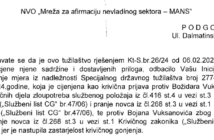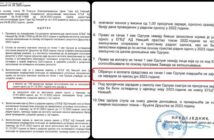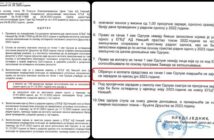One year after the change of government, Montenegro’s public does not have a single percentage more information compared to what we had during the rule of the Democratic Party of Socialists (DPS), while, when it comes to the legal framework, things still have not moved from the deadlock.
This was stated for “Vijesti” by the director of the MANS Investigative Centre, Dejan Milovac.
Today, the International Day for Universal Access to Information is celebrated around the world.
The government should soon discuss the Draft Law on Amendments to the Law on Free Access to Information (FAI).
Milovac referred to the state-owned airline Air Montenegro as an example of non-transparency and refusal to comply with the current Law on FAI.
According to decisions that “Vijesti” had access into, they refused to provide MANS with information regarding the lease agreement for business premises, documentation related to the costs of making the promotional video “Born to fly” (including received bids, the decision on the selection of the most favourable bid, the contracts concluded for the purpose of making the said video, the invoices paid), as well as copies of the consulting contract, agreement or other type of document regulating the relationship with Lufthanza Systems GmbH & Co.
“Following a new series of decisions by which the state airline banned access to information on how it spends the money, it is clear that we can no longer talk about ignorance of the said law, but about the continuation of the practice that greatly marked the previous three decades of party management of state companies… The former airline company is an example from which it should have been learned, instead of following it blindly by repeating the same mistakes. I think that it is absolutely unacceptable that the management of AirMontenegro treats the company as if it were in private ownership, and not owned by all citizens who have the right to know how it is managed”, Milovac states.
He believes that “there is no reason for a state-owned company to protect the privacy of the people it does business with or, as we have seen, to agree to contracts with third parties that are designed to protect the private rather than the public interest.”
“We do not see any valid reason not to disclose information to the public about the costs of renting office space or investing in marketing activities. Apart from one-sidedly rejecting access to complete information, the state-owned company did so without conducting an adequate harm test, which could explain why the disclosing of any of these documents would be detrimental to the public interest or the company’s interest”, Milovac points out.
AirMontenegro, on the other hand, argues that “an authority may restrict access to information or a part thereof if it is in the interest of protecting trade and other economic interests from disclosure of data relating to protection of competition and business secret in relation to intellectual property right, and if the information is a trade or tax secret in accordance with the law”.
”…Trade secret is an information, i.e. a set of data that is not fully or partially generally known or available to persons from the circles who regularly work with this type of data, which has economic value because it is not generally known and to which appropriate secrecy protection measures are applied, based on which the company that legally owns it ensures its secrecy. Trade secret is also an information that is determined by law and other regulations as a trade secret. On September 1, we requested consent for publishing the contract in question and they stated that they did not agree with the disclosing”, the company replied to “Vijesti” when asked about the lease agreement for business premises.
They also claim that, in accordance with the Law on FAI, they conducted a harm test.
“It was determined that the disclosure of the requested information would also constitute a violation of the provisions of the contracts in question which prescribe a confidentiality clause, which the contracting parties have undertaken by signing them,” AirMontenegro states.
When asked about the promotional video, the national airline said that “the requested documentation, i.e. information, contains data that represent the intellectual property of the bidder, and this body does not have approval for their disclosure.”
“In addition, the requested contracts stipulate a secrecy clause, and by signing the contract, the contracting parties have undertaken to respect the contractual provisions, so any violation of the provisions would result in compensation”. Disclosure of the requested information significantly jeopardized the interest from Article 14 of the Law on Free Access to Information, since restricting access to the requested information is in the interest of protecting the intellectual property rights contained in the requested documentation”, AirMontenegro explained.
The company also points out that the contract with Lufthanza Systems GmbH & Co “prescribes provisions on confidentiality of data which the contracting parties have undertaken by signing them”.
“The same article stipulates that the information may not be disclosed to a third party without the written consent of the contracting parties. We sent an email to the authorized person of Lufthansa Systems GmbH & Co.KG asking to approve the disclosure of the information, i.e. the contract in question, and they did not give their consent for the disclosure of information to any third party. In the end, in accordance with Article 16 of the Law on Free Access to Information, this body conducted a harm test and found that disclosure of this information would be a violation of the provisions of the contract prescribing a confidentiality clause, which the contracting parties have criminally and substantively undertaken by signing the contract, the national airline company stated.
Milovac estimates that “this gives the impression that the company’s management agrees too easily to the confidentiality clause in contracts it concludes with third parties, regardless of their value”.
“This waives the right to adequately represent the public interest in such legal affairs, and in this case it is the right of the public to know in what way the money of AirMontenegro is spent,” he said.
Milovac also states that “transparency in the work of state institutions is one of the key preconditions for civic control of their work, and a successful fight against corruption.”
“This is especially important when it comes to companies that the state establishes in order to bring additional money into the budget. On the example of the infamous fate of Montenegro Airlines, we had the opportunity to see how withholding of information is a fertile ground for corruption and abuse of various kinds”, he concluded.
Principle number three with no action
In his expose, the Prime Minister Zdravko Krivokapić stated “full transparency” as the third of 13 principles of work of the “first democratic government”.
“Transparency of the work of everyone in the state administration, as well as every individual, especially officials, should prevent corruption and bribery, but also ensure a timely response to all discrepancies. This is a common obligation of all of us, especially the media, trade unions, the NGO sector and literally every individual”, it is stated in his expose.
Milovac points out that “today we are marking the International Day for Universal Access to Information, and it is such examples that show that a change of government is not enough to fundamentally change the attitude of institutions towards the right of the public to know.”
“Unfortunately, the new government also does not have a sufficiently developed awareness of how important free access to information is for a successful and sustainable fight against corruption, and that big words can be useful as political marketing, but the real democratization of our country will require very concrete actions in order to improve the transparency of the work of state bodies”, Milovac points out.
CGO: New Government following the paved path of trade secrets
The Centre for Civic Education (CGO) assessed that there is proactivity in withholding, instead of disclosing information.
“It is especially worrying that the new government, which promised a huge improvement in transparency compared to the previous one, follows the paved path of non-transparency in practice, but also the abuse of certain legal institutes to withhold information”, Tamara Milaš, coordinator of the Human Rights Programme, said.
She points out that contracts with experts hired by the Government in certain departments, for renting premises for temporary or long-term work, contracts with directors of certain public companies are declared a trade secret, while numerous transactions from the state account, or documents on controversial deals remain unknown.
According to this NGO, Montenegro is still far from meeting the standards in proactive publishing and providing access to information, while the work of the Agency for Personal Data Protection and Free Access to Information also does not contribute to it.
The statement adds that the amended Law on FAI has not been sent to the Parliament yet, although the first year of the term of office of the new Government convocation is coming to an end soon.
Source: Vijesti



